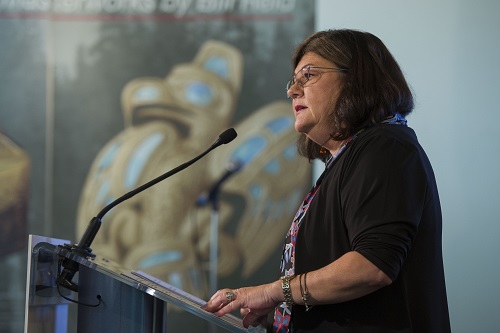National Addictions Awareness Week 2017
"Words Matter: The Opposite of Addiction is Connection":
Reach out to people who are struggling with addiction

A Message from Dr. Shannon McDonald, Deputy Chief Medical Officer
The theme of this year's National Addictions Awareness Week is Words Matter. And in the midst of our current public health emergency, I urge each of us to examine how we think and talk about substance use.
I'll start off with an important message that could save lives: If someone you love is struggling with substance use, the best thing you can do to help is to love them unconditionally. Being connected to family, friends or community—and feeling loved, valued and supported—is the best medicine there is to counteract addiction, according to many experts in the field. Research shows that not having deep emotional needs met (often as a result of childhood trauma, which can cause people to avoid further pain by "disconnecting" from others) is the main reason for addiction.
As a physician, I see each and every day how the use of stigmatizing language can perpetuate false and harmful myths around substance use and act as a barrier to healing and recovery. For example, many of us unthinkingly use words like "clean," "junkie" and "addict," without realizing that these terms can do great harm to those we are trying to help.
It's not always easy to know how to support people struggling with substance use issues. Beginning a conversation is the crucial first step. Respecting our own boundaries and needs is essential. Healthy boundaries that come from a place of love, self-respect and respect for others are not only desirable but necessary.
By exercising healthy boundaries, you can be an important connection for someone in your life who is using substances while keeping yourself well. When we are supporting people who are struggling with substance use, it is important to focus on building relationships based on safety and trust.
One thing that may not seem obvious but can go a long way is to recognize the efforts taken to manage substance use. People who struggle with addictions know their addictions affect everyone around them. You can prepare to meet people where they are at instead of telling them where they should be at.
As most overdoses are occurring in homes, where individuals are using alone, it is very important for people who are using to be in contact with others and to let someone else know so they can be checked on regularly. Stigma and isolation do not motivate, they drive substance use underground. Learn about harm-reduction supplies and services, and let your loved one know that you are comfortable supporting their access to these services.
In closing, we all have the opportunity to be good medicine in the life of people struggling with substance use. Family members and friends are often the most important influencers, because we are willing to do whatever it takes, for as long as it takes, to support our loved ones. With this in mind, we have put together a list of resources that will help you start these conversations today:
Talking about Substance Use information Sheet
Fraser health's "When words matter" campaign video
Fraser health's "When words matter"- Discussion Guide
Please reach out and connect. You could save a life.
Yours in wellness,
Dr. Shannon

